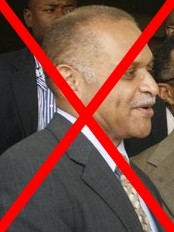 |
For more than seven hours, the Senators in favor of the candidacy of Prime Minister-designate, Me Bernard Gousse, “have tried” to analyze, on the form, the report of the Commission in a atmosphere stormy and confused. After lengthy arguments, endless debates of procedures on the faults or not of the report, between the Senators supporting the political vote and those who wanted a technical vote to determine the admissibility or not of the report of the Special Commission, late last night, the Senate rejected in a vote without surprise the candidacy of Me Bernard Gousse. A vote, however, unusual where only 16 Senators, members of the G16, raised their hands to signify their opposition, a vote where the elected in favor of Me Gousse have refused to vote.
Final vote, 16 against, no for, no abstentions…
The G16 reiterated that the choice of the Head of State was not the man for the job and that it was more likely to generate conflicts that promote the reconciliation between the different sectors of society.
Meanwhile, the Senators who disagree with the G16, like the Senators Andris Riché, Youri Latortue and François Annick Joseph, have strongly emphasized on the absence of recommendations produced by the Commission, contrary to the internal regulations of the Senate and try in vain to obtain a postponement of the session…
“I’m not saying that the report is incomplete, but it lacks the recommendations” stated the Senator Latortue “I say that the article 198 states that the report adopted by a commission should take the signature of the President and Rapporteur, and include a summary of minutes of work, observations, conclusions and recommendations. It reflects the opinion of the Commission and not the opinion of each member. In case of dissent, the conclusions become those of the majority of the Commission and the views of dissidents are recorded in the minutes.
President [of the Senate], I argued that in this report there are no recommendations. It has been written the word of recommendations but there is no content, also President it is defined in the internal regulations, that the Commission is an instance that works and makes recommendations to the Assembly, the Commission works for the Assembly, we can not make a Commission to make recommendations and refer then to the Assembly. So, in this sense Mr the President my thesis is that there are no recommendations, this thesis has been adopted by the Senators Anik and Beauzile. I stressed to the President, that the reminders to the regulations take precedence over all the main issues, so there I made an appeal to the regulations and we are at the level of the debate, at the level of the form not yet at the substance of the debate […] Normally President, when the regulation states that reports should contain recommendations, if there are no recommendations, we must postpone to another session, so that the Commission can make recommendations. Me intelligently, I asked an adjournment so that we can in private find a way out […] Recalls to the Regulations do not give rise to any debate […] there is only one person who can decide, the President of the Assembly. Now before moving on to other issues, the President must take his responsibility so that he notes […] We stated that there are no recommendations because the recommendations should go in a direction favorable or unfavorable.
We can not appoint a commission, that works for several weeks for then the commission returns the work to the Assembly. Now the President must decide, the President should say before all people, all students who are watching, before the whole public, in front of all the Senators that there are recommendations or not, and the procedure adopted must be an rational process. We are at the stage of admissibility of the report and now, the egulation us back to the Predident of the session, our colleague Jean Rodolphe Joazile […] what I am asking to the President is to refer to the law to take a decision and not to pressure politicians…”
Following the intervention of Senator Latortue, the President of the Senate answered “in the internal rules of the Senate it is said and I quote : the report adopted by a commission should take the signature of the President and Rapporteur, and include a summary of minutes of work, observations, conclusions and recommendations. It reflects the opinion of the Commission and not the opinion of each member. In case of dissent, the conclusions become those of the majority of the Commission and the views of dissidents are recorded in the minutes.
Considering that Sen. Youri Latortue stated that the report as submitted by the Commission contains no recommendations.
Considering that the point 5 of the report presents the recommendations and that the Commission refers to the wisdom of the Assembly who is sovereign.
Considering that by submitting the report to the office of the Senate, the Commission is no longer master of this report, this report becomes the property of the Assembly.
In its reasons the President of the Senate accepts the recommendations of the Commission and asks to the Assembly of Senators to continue the discussion on the substance…”
Although Sen. Youri Latortue, in favor of the candidacy of Me Gousse, had tried after the vote to contest the regularity, the vote of the Upper House was formalized by Jean Rodolphe Joazile “16 Parliamentarians have voted Tuesday night against the Prime Minister designate Bernard Gousse, 13 refused to vote, the vote is valid” adding that “the President of the Republic will now have to designate another Prime Minister.”
For the Sen. Joseph Lambert there is no discussion to have on this vote “it is a normal vote since 16 Senators have voted…” recalling that the members of the GPR had warned the President Michel Martelly, that Bernard Gousse had no chance to pass the stage of ratification. He asks to the Head of State to designate another Prime Minister for the formation of a new Government, reaffirming that his block is committed to working with him [?] for the recovery of the country…
After this second failure, several observers are wondering about the capacity of actors to give a political response to the many economic and social problems of the country
 Haïti – RD : Les autorités militaires dominicaines appuient la formation d’une armée en Haïti
Haïti – RD : Les autorités militaires dominicaines appuient la formation d’une armée en Haïti Haïti – AVIS : Moratoire sur l’octroi de fréquences de radio FM
Haïti – AVIS : Moratoire sur l’octroi de fréquences de radio FM Haïti – FLASH : 94 morts par balles pour les 6 premiers mois
Haïti – FLASH : 94 morts par balles pour les 6 premiers mois Haïti – Politique : Moïse en tournée à Camp-Perrin et aux Côtes-de-Fer
Haïti – Politique : Moïse en tournée à Camp-Perrin et aux Côtes-de-Fer
Leave a Reply